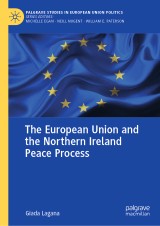Details

The European Union and the Northern Ireland Peace Process
Palgrave Studies in European Union Politics
|
128,39 € |
|
| Verlag: | Palgrave Macmillan |
| Format: | |
| Veröffentl.: | 26.10.2020 |
| ISBN/EAN: | 9783030591175 |
| Sprache: | englisch |
Dieses eBook enthält ein Wasserzeichen.
Beschreibungen
This book examines the economic and political contributions of the EU to the Northern Ireland peace process, tracing the genesis of EU involvement since 1979 and analysing how it acted as an arena in which to foster dialogue and positive cooperation. Based on extensive archival research and exclusive elite interviews this volume provides the first comprehensive study of how the EU contributed to the reconfiguration of Northern Ireland from a site of conflict to a site of conflict amelioration and peace-building. The book demonstrates that the relationship between Northern Ireland and the EU has been much more significant in the peace process than previously suggested.
Chapter 1. Introduction.- Chapter 2. Metagoverning Peacebuilding in Northern Ireland.- Chapter 3. The genesis of the European Union/Northern Ireland peacebuilding network.- Chapter 4. The 1984 Haagerup Report on the situation in Northern Ireland.- Chapter 5. European Union Structural Funds programmes on the island of Ireland: Interreg and the cross-border dimension.- Chapter 6. The European Union Programme for Peace and Reconciliation in Northern Ireland.- Chapter 7. The Belfast/Good Friday Agreement: cross-border cooperation and peacebuilding in the context of the new institutions.- Chapter 8. Conclusion.
<b>Giada Lagana</b> is an associate researcher at Cardiff University, UK. She holds a PhD in Political Science and Sociology from the National University of Ireland, Galway. Her work has appeared in various peer reviewed journals such as Space and Polity, European Urban and Regional Studies, and Research Methods Cases in Politics & International Relations.
This book examines the economic and political contributions of the EU to the Northern Ireland peace process, tracing the genesis of EU involvement since 1979 and analysing how it acted as an arena in which to foster dialogue and positive cooperation. Based on extensive archival research and exclusive elite interviews this volume provides the first comprehensive study of how the EU contributed to the reconfiguration of Northern Ireland from a site of conflict to a site of conflict amelioration and peace-building. The book demonstrates that the relationship between Northern Ireland and the EU has been much more significant in the peace process than previously suggested. <div><br></div><div><b>Giada Lagana</b> is an associate researcher at Cardiff University, UK. She holds a PhD in Political Science and Sociology from the National University of Ireland, Galway. Her work has appeared in various peer reviewed journals such as Space and Polity, European Urban and Regional Studies, and Research Methods Cases in Politics & International Relations.<br></div>
Uncovers historic and contemporary connections between EU institutions Outlines the EU’s approach to conflict resolution in Northern Ireland Investigates the potential of soft power to facilitate political change from governmental to grass-roots levels
"This book examines the beginnings and the development of the EU’s involvement in the peace process in Northern Ireland across various dimensions, including action from the European Parliament and EU funds for cross-border cooperation and reconciliation initiatives. In so doing, new insights are revealed that constitute a welcome addition to knowledge of the area. Through a combination of meticulous archival research (including private correspondence and public statements), and elite interviews, Lagana has been able to piece together a pattern of behind-scenes processes of and in-plenary discussions in order to present a detailed and illuminating account of the EU’s engagement in this troubled region. This is a timely piece of research that speaks not only to the current state of affairs in Northern Ireland following the UK’s withdrawal from the EU, but also to the potential scope for the EU itself to adapt to these changing circumstances."<div><b>Katy Hayward</b>, Professor of Political Sociology, Queen’s University Belfast and Senior Fellow, The UK in a Changing Europe. <br></div>

















